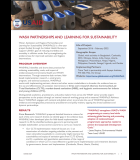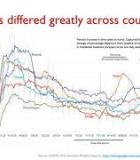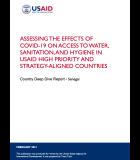Collaborative Management for a Sustainable Fisheries Future in Senegal (COMFISH)
Senegal’s fisheries play a critical role in food security, livelihoods, and local and national economic growth. Fisheries products constitute 12.3 % of export earnings and 1.3 percent of Senegal’s Gross Domestic Product (GDP) (not including post-harvest activities such as marketing, artisanal and industrial processing and inland captures). Further, about 600,000 people are directly or indirectly employed in the fisheries sector. Senegal is also one of the biggest fish consuming countries in the world, with annual per capita fish consumption of 26 kilograms (Kg). The fisheries sector has experienced declining productivity in recent years due to degradation and depletion of resources, misguided investments, overfishing, and overinvestment in onshore processing of fisheries products.
Senegal’s marine fisheries are part of the West Africa Marine Ecoregion (WAMER), one of the world’s most biologically diverse areas which is sustained by oceanic upwelling and enhanced by additional nutrient influxes from several major river/estuary/delta complexes. Maintaining this rich biodiversity and the health and quality of this highly productive marine ecosystem is critical to maintaining a sustainable supply of goods (e.g., food) and services (e.g., employment) for Senegal’s citizens
Activity Description
COMFISH is a five year initiative (February 14, 2011 – September 30, 2016) being implemented by URI in collaboration with the Government of Senegal and other local partners to reform the country’s fisheries sector to sustain productivity and enhance the participation of artisanal fisherman and women in the artisanal fishery value chains. Specifically, the project aims to support DPM in implementing the Fisheries and Aquaculture Sector Policy Letter (LPS) which serves as a national framework for sustainable management of fisheries resources. COMFISH works with a diverse groups of partners to reach its objectives, including the Government of Senegal, private entities, academic institutions, research institutions and Non-Governmental Organizations (NGOs) for women and artisanal fishing. Recently, partnerships are also beginning to form between COMFISH and other USAID/Senegal projects.
The important strategies and concepts that COMFISH has included in the project design and implemented in order to meet this long term objective include: • Ecosystem based management; • Establishment of specific critical enabling conditions for sustainable fisheries at all levels; • Inclusive and participatory fisheries management planning; and, • Learning by doing.
Expected Outcomes
• Institutional and stakeholder capacity strengthened at all levels of governance to implement an ecosystem-based, collaborative management approach to sustainable fisheries to prevent overfishing, and to increase climate change resilience
• Strategies, policies and best practices identified, tested and applied to strengthen resilience to climate change and address destructive and unsustainable marine resource uses that threaten biodiversity conservation in the West African ecoregion
• Vulnerability assessed and capacity of vulnerable coastal communities strengthened to adapt to the impacts of climate variability and change
• Increased social and economic benefits to artisanal fishing communities provide incentives to a continued sustainable fisheries agenda and increased climate change resilience.





